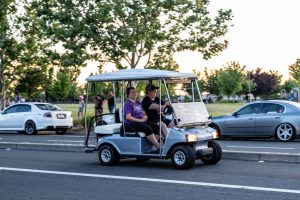Golf carts are no longer just for golf. If you go to the beach, the lake or even in your own neighborhood subdivision, golf carts are likely to be on the road. In our little area at Tims Ford Lake, 80% of the residents have a golf cart. The Days have resisted the trend in an effort to force ourselves to walk more but we are definitely in the minority. Each year there are approximately 15,000 golf cart injuries. If you own a golf cart or have been injured in a golf cart accident, you should understand some key legal issues.
Golf carts have been regulated by the National Highway Traffic Safety Administration since 1989. They are considered a low-speed vehicle. Most golf carts have an average speed of between 12 and 14 mph. However, there are street-legal and performance golf carts that can travel up to speeds of 25 mph. And, of course, if an owner modifies the golf cart, the speeds can even be higher. The fastest recorded speed for a golf cart was 133 mph.
Golf carts may be titled and registered in Tennessee. However, in order to be titled and registered, they must meet certain safety requirements. Those requirements are: head lights, stop lamps, front and rear turn signal lights, tail lamps, reflectors, a windshield, seat belts, a VIN number, a parking brake and appropriate mirrors. All of this equipment must meet the specifications under state and federal law. Finally, the owner of the golf cart must submit an affidavit attesting that the golf cart has been appropriately modified to meet all of the legal requirements.
In Tennessee, low speed vehicles like street-modified golf carts can only be operated on roads with a speed limit of 35 mph or less. One caveat, at an intersection, a low-speed vehicle can cross over a road with a speed limit in excess of 35 mph. Finally, a county or town can prohibit the operation of low-speed vehicles even on a 35-mph street if it is in the interest of public safety to do so.
In addition, anyone operating a street-legal golf cart on Tennessee’s roads must have a Class D driver license in their possession while operating the vehicle. In other words, you must have a regular driver’s license to drive a low-speed vehicle on a public road. From our observations, there are a lot of parents in Tennessee who do not understand this requirement.
Now, let’s talk about liability and insurance issues. First, you should know that if you are involved in a golf cart accident on a street or roadway, you are 1.5 times more likely to have a brain injury than if you have a golf cart accident on the golf course. This is not surprising. Increased speeds almost always increase injury severity and being ejected onto pavement is generally more traumatic than being injected on to a grassy fairway. For these same reasons, you are twice as likely to be hospitalized if you are involved in a golf cart accident on a roadway.
So let’s say you allow your 14-year-old child to drive himself and a friend to another friend’s house in your neighborhood using your non-street legal golf cart. While doing so, an accident occurs with a car. Your son’s passenger was hurt and so was the driver of the car. Two very important legal issues are created as a result.
First, will there be criminal penalties because you allowed your unlicensed son to drive a golf cart on a public roadway? Prosecutors have wide discretion on issues such as these and the extent of injuries often plays a role.
Second, do you have insurance that will cover this accident? Your homeowner’s policy almost certainly will not cover any claims because they almost universally do not cover accidents involving motor vehicles. Your motor vehicle policy will probably not cover the loss either unless you listed the golf cart as a vehicle on your policy. If you have an umbrella policy, this is a toss-up. Some umbrella policies require there to be an underlying policy that covers the loss primarily. In addition, some umbrella policies exclude recreational vehicles. If the golf cart was not modified to be street-legal and was not properly registered and titled with the county clerk, the insurance company will likely take the position that the golf cart was a recreational vehicle. If you are a golf cart owner, you need to undertake a careful review of your existing policies to determine if your golf cart is covered under your existing policies. If not, call your agent and purchase a separate golf cart liability policy to protect your assets and anyone who is harmed as a result of the operation of your golf cart.
As you can see, there are a host of legal issues surrounding golf cart accidents, which is why it is critical to hire an experienced injury attorney if you are involved in a golf cart accident. Our award-winning lawyers are here to answer your questions in a free, initial consultation. We handle all golf cart accident cases on a contingency-basis so we only get paid if we recover money for you. To get started, give us a call at one of our convenient Middle Tennessee locations:
Nashville: 615-669-3993
Murfreesboro: 615-867-9900
Brentwood: 615-742-4880
Toll-Free: 866-812-8787
 Tennessee Injury Law Center
Tennessee Injury Law Center


